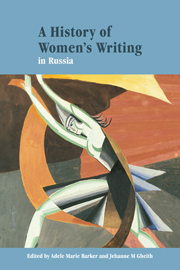Book contents
- Frontmatter
- Contents
- Notes on contributors
- Acknowledgments
- Note on transliteration
- List of abbreviations
- Introduction
- 1 Women's image in Russian medieval literature
- 2 Sappho, Corinna, and Niobe: genres and personae in Russian women's writing, 1760–1820
- 3 The inexperienced muse: Russian women and poetry in the first half of the nineteenth century
- 4 Women of the 1830s and 1850s: alternative periodizations
- 5 “A particle of our soul”: prerevolutionary autobiography by Russian women writers
- 6 The women of Russian Montparnasse (Paris, 1920–1940)
- 7 Women in Russian Symbolism: beyond the algebra of love
- 8 The eastern path of exile: Russian women's writing in China
- 9 Realist prose writers, 1881–1929
- 10 Women and gender in post-symbolist poetry and the Stalin era
- 11 Writing the female body politic (1945–1985)
- 12 In their own words? Soviet women writers and the search for self
- 13 Women's poetry since the sixties
- 14 The persistence of memory: women's prose since the sixties
- 15 Perestroika and post-soviet prose: from dazzle to dispersal
- Bibliographical guide to writers and their works
- Guide to further reading
- Index
3 - The inexperienced muse: Russian women and poetry in the first half of the nineteenth century
Published online by Cambridge University Press: 22 September 2009
- Frontmatter
- Contents
- Notes on contributors
- Acknowledgments
- Note on transliteration
- List of abbreviations
- Introduction
- 1 Women's image in Russian medieval literature
- 2 Sappho, Corinna, and Niobe: genres and personae in Russian women's writing, 1760–1820
- 3 The inexperienced muse: Russian women and poetry in the first half of the nineteenth century
- 4 Women of the 1830s and 1850s: alternative periodizations
- 5 “A particle of our soul”: prerevolutionary autobiography by Russian women writers
- 6 The women of Russian Montparnasse (Paris, 1920–1940)
- 7 Women in Russian Symbolism: beyond the algebra of love
- 8 The eastern path of exile: Russian women's writing in China
- 9 Realist prose writers, 1881–1929
- 10 Women and gender in post-symbolist poetry and the Stalin era
- 11 Writing the female body politic (1945–1985)
- 12 In their own words? Soviet women writers and the search for self
- 13 Women's poetry since the sixties
- 14 The persistence of memory: women's prose since the sixties
- 15 Perestroika and post-soviet prose: from dazzle to dispersal
- Bibliographical guide to writers and their works
- Guide to further reading
- Index
Summary
When Anna Bunina (1774–1829), the first major Russian woman poet of the nineteenth century and one of the first Russian women to sustain a literary career, entitled her first collection of poetry Neopytnaia muza (The Inexperienced Muse, 1809–1812), she marked not only her own inexperience as a poet but the broader absence of women from the ranks of Russian poets. Only a generation later the situation had changed dramatically. By 1845 the young religious poet Elisaveta Shakhova (1822–1899) could style herself the “youngest sister of sisters who have gone before” (“K zhenshchinam-poetam” [“To Women-Poets”]), and could have named a score of women writing poetry. Had she attempted a female genealogy she might have named among her older “sisters” not only Bunina, but Bunina's peers, the Sentimentalist writers Mar'ia Pospelova (1780–1805), Anna Volkova (1781–1834), and Liubov' Krichevskaia (d. after 1841), or the scholarly poet and classicist Ekaterina Kul'man (1808—1825). Although the names of many women who inspired poets in the 1820s are remembered, only a few women are known to have written poetry themselves, among them Princess Zinaida Volkonskaia (1789–1862), Anna Gotovtseva (1799–1871), Elizaveta Timasheva (1798–1881), and Mariia Lisitsyna (d. 1842?). From the 1830s onward, however, women published poetry in sufficient numbers to attract critical attention.
- Type
- Chapter
- Information
- A History of Women's Writing in Russia , pp. 62 - 84Publisher: Cambridge University PressPrint publication year: 2002
- 3
- Cited by



